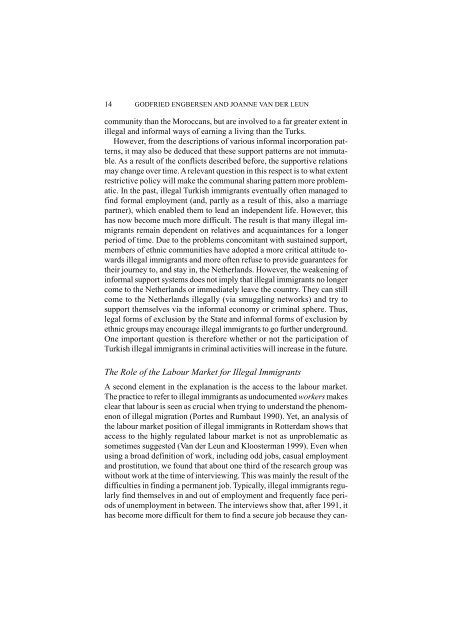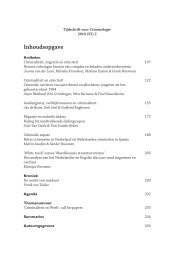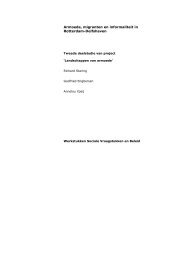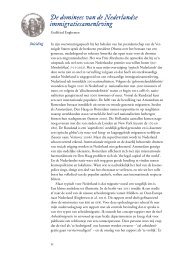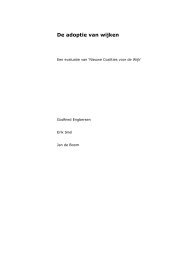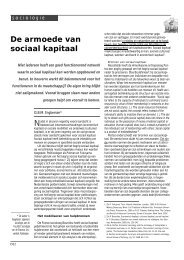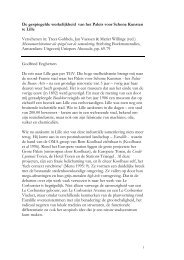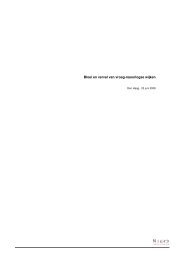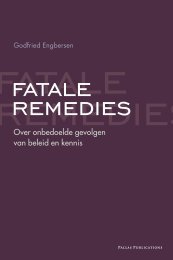THE SOCIAL CONSTRUCTION OF ILLEGALITY AND CRIMINALITY ...
THE SOCIAL CONSTRUCTION OF ILLEGALITY AND CRIMINALITY ...
THE SOCIAL CONSTRUCTION OF ILLEGALITY AND CRIMINALITY ...
You also want an ePaper? Increase the reach of your titles
YUMPU automatically turns print PDFs into web optimized ePapers that Google loves.
14<br />
GODFRIED ENGBERSEN <strong>AND</strong> JOANNE VAN DER LEUN<br />
community than the Moroccans, but are involved to a far greater extent in<br />
illegal and informal ways of earning a living than the Turks.<br />
However, from the descriptions of various informal incorporation patterns,<br />
it may also be deduced that these support patterns are not immutable.<br />
As a result of the conflicts described before, the supportive relations<br />
may change over time. A relevant question in this respect is to what extent<br />
restrictive policy will make the communal sharing pattern more problematic.<br />
In the past, illegal Turkish immigrants eventually often managed to<br />
find formal employment (and, partly as a result of this, also a marriage<br />
partner), which enabled them to lead an independent life. However, this<br />
has now become much more difficult. The result is that many illegal immigrants<br />
remain dependent on relatives and acquaintances for a longer<br />
period of time. Due to the problems concomitant with sustained support,<br />
members of ethnic communities have adopted a more critical attitude towards<br />
illegal immigrants and more often refuse to provide guarantees for<br />
their journey to, and stay in, the Netherlands. However, the weakening of<br />
informal support systems does not imply that illegal immigrants no longer<br />
come to the Netherlands or immediately leave the country. They can still<br />
come to the Netherlands illegally (via smuggling networks) and try to<br />
support themselves via the informal economy or criminal sphere. Thus,<br />
legal forms of exclusion by the State and informal forms of exclusion by<br />
ethnic groups may encourage illegal immigrants to go further underground.<br />
One important question is therefore whether or not the participation of<br />
Turkish illegal immigrants in criminal activities will increase in the future.<br />
The Role of the Labour Market for Illegal Immigrants<br />
A second element in the explanation is the access to the labour market.<br />
The practice to refer to illegal immigrants as undocumented workers makes<br />
clear that labour is seen as crucial when trying to understand the phenomenon<br />
of illegal migration (Portes and Rumbaut 1990). Yet, an analysis of<br />
the labour market position of illegal immigrants in Rotterdam shows that<br />
access to the highly regulated labour market is not as unproblematic as<br />
sometimes suggested (Van der Leun and Kloosterman 1999). Even when<br />
using a broad definition of work, including odd jobs, casual employment<br />
and prostitution, we found that about one third of the research group was<br />
without work at the time of interviewing. This was mainly the result of the<br />
difficulties in finding a permanent job. Typically, illegal immigrants regularly<br />
find themselves in and out of employment and frequently face periods<br />
of unemployment in between. The interviews show that, after 1991, it<br />
has become more difficult for them to find a secure job because they can-


